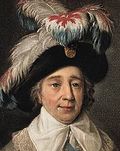 |
Jean-Nicolas-Paul-François Barras
b. 30 Jun 1755, Fox-Amphoux, Var [1]
d. 29 Jan 1829, Chaillot, Seine |
| Title: |
Président de la Convention nationale (President of the National Convention) |
| Term: |
4 Feb 1795 - 19 Feb 1795 |
| Chronology: |
4 Feb 1795,
elected, session of the National Convention, salle des Machines, Palais national des Tuileries, Paris [2] |
|
5 Feb 1795,
assumed the chair, session of the National Convention, salle des Machines, Palais national des Tuileries, Paris [2] |
|
19 Feb 1795,
ceased to exercise the functions of office upon the election of a successor [3] |
| Names/titles: |
Vicomte de Barras (viscount of Barras) |
|
Président du Directoire exécutif de la République française (President of the Executive Directory of the French Republic) (1 Nov 1796 - 30 Jan 1797, 27 Nov 1797 - 25 Feb 1798, 25 Feb 1799 - 26 May 1799) [see details]; membre du Directoire exécutif de la République française (member of the Executive Directory of the French Republic) (2 Nov 1795 - 10 Nov 1799) [see details] |
| Biography: |
| Descended from a noble family of Provence; joined the regiment of Languedoc (1771); in the rank of sub-lieutenant he was transferred to the regiment of Pondicherry (1776); landed at Pondicherry in 1777; after the seizure of Pondicherry by the British troops (1778), he followed his regiment to Madras; returned to France (1780) and was promoted to lieutenant (1780); took part in colonial expeditions (1781-1783); retired from the army (1783); joined the Jacobin Club; took part in the storming of the Bastille; elected as a substitute deputy of the département of Var to the Convention nationale (National Convention) (1792-1795), took place of Edmond-Louis-Alexis Dubois-Crancé, who opted for the Ardennes, and took his seat in the Convention; voted for the king's death in the trial of Louis XVI; sent to the Hautes-Alpes and Basses-Alpes as representative of the Convention (9 Mar 1793 - 30 Apr 1793) for recruitment of the soldiers; appointed the Convention's representative with the Army of Italy (30 Apr 1793 - 23 Jan 1794), distinguished himself in capturing Toulon (1793); named commander-in-chief of the forces defending the Convention against the national guard; played an outstanding role in overthrowing the dictatorship of the Robespierrists (27 Jul 1794); served on the Comité de sûreté générale (Committee of General Security) (5 Nov 1794 - 5 Mar 1795, 1 Sep 1795 - 4 Nov 1795) and as President of the National Convention (4 Feb 1795 - 19 Feb 1795); appointed commander of the Army of the Interior (4 Oct 1795); together with General Napoléon Bonaparte defended the regime against an attempted royalist insurrection (5 Oct 1795); elected to the Corps législatif (1795); elected (1 Nov 1795) one of the original members of the Directoire exécutif (Executive Directory); three times served as President of the Directory (1 Nov 1796 - 30 Jan 1797, 27 Nov 1797 - 25 Feb 1798, 25 Feb 1799 - 26 May 1799); emerged as one of its leaders and became notorious for excessive corruption and luxurious living; engineered the coup of 18 Fructidor (4 Sep 1797), which made him the most important figure in the republican government; elected to the Conseil des Cinq-Cents (Council of Five Hundred) (12 Apr 1798) and to the Conseil des Anciens (Council of Ancients) (12 Apr 1799); resigned as a Directory member on the eve of the 18 Brumaire coup (9 Nov 1799); was exiled to Brussels (1801-1805); after the restoration of the Bourbon monarchy, was permitted to live in peace at his estate at Chaillot.
|
| Biographical sources: Dictionnaire des Conventionnels, 29-35;
Dictionnaire des parlementaires français 1789-1889, 1:176-177; "Bulletin de la Société d'études scientifiques et archéologiques de la ville de Draguignan" (Draguignan: Imprimerie Latil Frères, 1911) (web site) |
| |
| [1] |
Barras was born 30 Jun 1755 and baptised 4 Jul 1755 as is evident from his baptismal record preserved in the Archives of the Var département; register of baptisms, marriages and burials in the parish of Fox-Amphoux, 1703-1789, 7 E 64/1, p. 157 (digital copy). It was also published in "Bulletin de la Société d'études scientifiques", op. cit., 28:347: "Acte de baptême de Barras [en marge] Baptême Barras - L'an mille sept cent cinquante-cinq et le trentième jour du mois de juin est né noble Jean-Nicolas-Paul-François de Barras, fils de noble François et de dame Élisabet Pourcelli, son épouse, et a été baptisé le quatre juillet prochain. <...> Arch. cles de Fox-Amphoux, GG. 2, f° 143" |
| [2] |
Moniteur universel, No. 140, 20 pluviôse an III (8 Feb 1795), p. 575. |
| [3] |
Moniteur universel, No. 155, 5 ventôse an III (23 Feb 1795), p. 634. |

